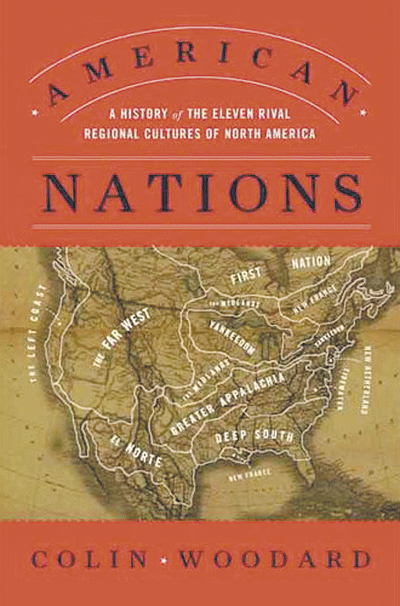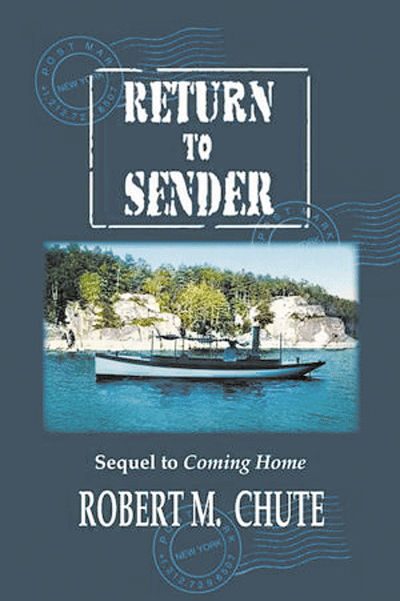AMERICAN NATIONS: A HISTORY OF THE
ELEVEN RIVAL REGIONAL CULTURES OF NORTH AMERICA
By Colin Woodard
Viking, 2011, 371 pages, $30, ISBN 978-0-670-02296-0
In 1911, American historian Henry B. Adams (1838-1918) said: “American society is a sort of flat, fresh-water pond which absorbs silently, without reaction, anything which is thrown into it.” And he couldn’t have been more wrong, according to award-winning journalist and historian Colin Woodard.
AMERICAN NATIONS is Portland author Woodard’s controversial and thought-provoking explanation of why there isn’t one America, but several Americas made up of 11 distinctly different regional cultural “nations” formed into the loose confederations of Mexico, the United States and Canada.
Woodard’s articles have appeared in numerous publications, and he has written three other books, including THE LOBSTER COAST (Penguin, 2004).
This is an important sociological study which reveals how and why strongly held regional cultural ideals and principles “have been growing wider, fueling culture wars, constitutional struggles and ever more frequent pleas for unity.”
Woodard is a talented writer, offering a fascinating and perceptive view of North America’s regional cultural development from early colonization in the 16th century to today, highlighting the political, economic, religious and social identities of North America. The names of these “nations” reveals much about their unique character — Yankeedom, New Netherland (New York City), the Midlands, Tidewater, Greater Appalachia, the Deep South, New France, El Norte, the Left Coast, the Far West and the First Nation.
He deftly describes how each “nation” was created (through immigration, migration, conquest, and expansion) and why, 300 years later, North America still struggles with political chaos, rampant separatism, civil instability and disparate fights for control of government. Unfortunately, Woodard concludes that the future of North American unity is not encouraging.
Learn, too, which “nation” really introduced slavery to North America, the correct origin and meaning of the term “Hoosier,” and how the Confederacy could have successfully seceded from the Union without a fight.
RETURN TO SENDER
By Robert M. Chute
Just Write Books, 2011
152 pages, $19.95
ISBN 978-1-934949-50-4
Poland author Robert Chute is back in fine form with this mystery sequel to 2009’s COMING HOME (Just Write Books). Again set in the wilderness of northwest Maine, it is now 1951 and the quirky characters of Wyman Falls have another murder to solve.
RETURN TO SENDER is a much better effort than COMING HOME, with a tighter plot, more suspense and action, and more sharply definded characters. This is what good mystery writing should look like.
Chute is a clever, thoughtful writer, creating a story true to the color and atmosphere of rural Maine during the Korean War era, right down to the 1950s-era social taboos of homosexuality and illicit drug use, and the loneliness of fathers away at war in Korea.
When New York City photographer Tony Janus is found dead in the lake, it appears to be an accidental drowning, but the local sheriff and district attorney both smell a rat and think it is a case of murder. The victim’s stepsister, Melonie, thinks she knows the truth and the identity of the alleged killer. While the law pursues an investigation based on slim evidence, Melonie embarks on her own plan for diabolical revenge.
Meanwhile, the killer is well aware of the police and Melonie’s interest, and takes steps to confuse one and eliminate the other.
Add a rich playboy, an ice-queen fiancé, a savvy county sheriff, a hapless simpleton who knows too much but doesn’t know it, a couple of unlikely hoodlum heroes and a killer who thinks “planning a murder was a lot like solving one, only in reverse,” and Chute has a sure hit mystery here.
— Bill Bushnell lives and writes in Harpswell.
Send questions/comments to the editors.




Success. Please wait for the page to reload. If the page does not reload within 5 seconds, please refresh the page.
Enter your email and password to access comments.
Hi, to comment on stories you must . This profile is in addition to your subscription and website login.
Already have a commenting profile? .
Invalid username/password.
Please check your email to confirm and complete your registration.
Only subscribers are eligible to post comments. Please subscribe or login first for digital access. Here’s why.
Use the form below to reset your password. When you've submitted your account email, we will send an email with a reset code.